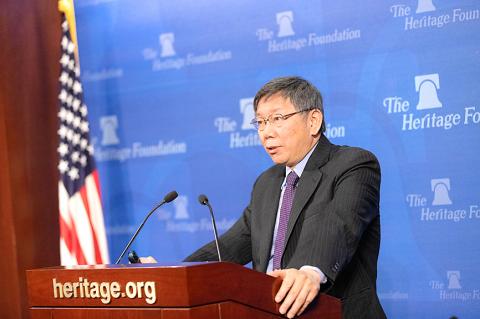“Having affinity toward the US and being friendly toward China” is a strategic tool that does not go against Taiwan’s sovereignty, Taipei Mayor Ko Wen-je (柯文哲) said in Washington on Thursday.
Ko made the remark in response to media queries at a meeting with the Metro Atlanta Chamber in Georgia.
On Wednesday, the fifth day of Ko’s visit to the US, he spoke at the Heritage Foundation in Washington about his background and political views.

Photo courtesy of the Taipei City Government
He restated his “five mutual principles” — recognition, understanding, respect, cooperation and consideration of each other’s interests — as his approach to the cross-strait relationship and said that Taiwan, being a small country, must be “wise and strong” to survive and interact with world powers.
When asked by the host what he would do in response to the long-term problem of Beijing claiming that Taiwan is part of China, Ko said that there is no mutual trust between the two.
While the Chinese Nationalist Party (KMT) endorses the so-called “1992 consensus,” saying both sides acknowledge “one China,” with each having its own interpretation of what “China” means, China’s only accepts the “one China” part, so the KMT’s “1992 consensus” is not accepted by China, Ko said.
The “1992 consensus” is a term former Mainland Affairs Council chairman Su Chi (蘇起) in 2006 admitted making up in 2000.
“As for the Democratic Progressive Party [DPP], President Tsai Ing-wen (蔡英文) commits to maintaining the status quo, but the situation is more like: ‘What is important is not what you say or what you do, but what I feel,’” he said, adding that Beijing sees Tsai as pursuing “desinicization” and is upset about it.
The KMT and the DPP have trouble communicating with China, but although many people recognize the barrier between the two sides, Taiwan and China should not completely cut off communications because they have a close relationship, Ko said.
The reality is that there are more than 380,000 Chinese spouses in Taiwan, more than 2 million Taiwanese working in China and the Taiwanese trade surplus in goods with China was about US$85 billion last year, so haboring hatred against each other is not good for either side, he said.
When asked by member of the audience to explain what strategy Taiwan should use to deal with the US and China, Ko — giving an analogy — said it is an awkward situation, as “our hardware was made in China, but the software was made in the US.”
Taiwan and China speak the same language and are the same race, but Taiwanese values are more closely matched with the US, he said.
“With the US-China trade dispute, Taiwan should think about how it can survive, rather than what it can leverage for its benefit,” he said. “Having affinity toward the US and being friendly toward China is our basic strategy... This is the best national strategy for Taiwan.”

Alain Robert, known as the "French Spider-Man," praised Alex Honnold as exceptionally well-prepared after the US climber completed a free solo ascent of Taipei 101 yesterday. Robert said Honnold's ascent of the 508m-tall skyscraper in just more than one-and-a-half hours without using safety ropes or equipment was a remarkable achievement. "This is my life," he said in an interview conducted in French, adding that he liked the feeling of being "on the edge of danger." The 63-year-old Frenchman climbed Taipei 101 using ropes in December 2004, taking about four hours to reach the top. On a one-to-10 scale of difficulty, Robert said Taipei 101

A preclearance service to facilitate entry for people traveling to select airports in Japan would be available from Thursday next week to Feb. 25 at Taiwan Taoyuan International Airport, Taoyuan International Airport Corp (TIAC) said on Tuesday. The service was first made available to Taiwanese travelers throughout the winter vacation of 2024 and during the Lunar New Year holiday. In addition to flights to the Japanese cities of Hakodate, Asahikawa, Akita, Sendai, Niigata, Okayama, Takamatsu, Kumamoto and Kagoshima, the service would be available to travelers to Kobe and Oita. The service can be accessed by passengers of 15 flight routes operated by

Taiwanese and US defense groups are collaborating to introduce deployable, semi-autonomous manufacturing systems for drones and components in a boost to the nation’s supply chain resilience. Taiwan’s G-Tech Optroelectronics Corp subsidiary GTOC and the US’ Aerkomm Inc on Friday announced an agreement with fellow US-based Firestorm Lab to adopt the latter’s xCell, a technology featuring 3D printers fitted in 6.1m container units. The systems enable aerial platforms and parts to be produced in high volumes from dispersed nodes capable of rapid redeployment, to minimize the risk of enemy strikes and to meet field requirements, they said. Firestorm chief technology officer Ian Muceus said

MORE FALL: An investigation into one of Xi’s key cronies, part of a broader ‘anti-corruption’ drive, indicates that he might have a deep distrust in the military, an expert said China’s latest military purge underscores systemic risks in its shift from collective leadership to sole rule under Chinese President Xi Jinping (習近平), and could disrupt its chain of command and military capabilities, a national security official said yesterday. If decisionmaking within the Chinese Communist Party has become “irrational” under one-man rule, the Taiwan Strait and the regional situation must be approached with extreme caution, given unforeseen risks, they added. The anonymous official made the remarks as China’s Central Military Commission Vice Chairman Zhang Youxia (張又俠) and Joint Staff Department Chief of Staff Liu Zhenli (劉振立) were reportedly being investigated for suspected “serious